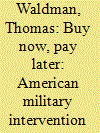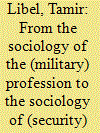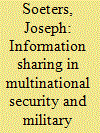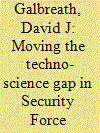|
|
|
Sort Order |
|
|
|
Items / Page
|
|
|
|
|
|
|
| Srl | Item |
| 1 |
ID:
166592


|
|
|
|
|
| Summary/Abstract |
This paper explores the notion that US efforts to evade the political costs of war paradoxically contribute to the subsequent exacerbation of costs over time. Leaders seek to purchase political capital in the short term by limiting the costs and requirements of military operations, but in doing so cause strategic and political liabilities to mount in the long run. While identification of such behaviour is not new, insufficient attention has been devoted to explaining its causes, dynamics, and manifestations in relation to key decisions on and in war. Evidence derived from studies of recent American discretionary campaigns is analysed to advance an argument with respect to this pattern of self-defeating strategic behaviour.
|
|
|
|
|
|
|
|
|
|
|
|
|
|
|
|
| 2 |
ID:
166591


|
|
|
|
|
| Summary/Abstract |
Few would disagree that European militaries have experienced dramatic changes since the end of the Cold War. Much of the discussion on these changes to date has referred to the concept of professionalism. However, this approach became outdated as professions in post-industrialist societies entered a state of crisis as a result of growing competition from a variety of competitors. The present study adapts a new framework from the sociology of knowledge literature – sociology of expertise – into one, sociology of security expertise, which is suitable for study of contemporary armed forces. Its utility is demonstrated through analysis of five European professional military education institutions. The analysis shows that European military organisations are transiting, albeit in various degrees, from one form of social organisation of military knowledge production – associated with the military education model common to traditional military colleges – toward another, which is related to the military education model of national defence universities. Hence it is highly probable that European military organisations lose, either voluntary or unintentionally, their professional character and can no longer be unquestionably assumed to be military professions. Hence, they should be analysed hereafter using the sociology of security expertise framework.
|
|
|
|
|
|
|
|
|
|
|
|
|
|
|
|
| 3 |
ID:
166589


|
|
|
|
|
| Summary/Abstract |
Military operations increasingly require cooperation between agencies within the same nation, but also collaboration with security and military organizations internationally. Throughout history multinational military cooperation has often been an appropriate way to conduct major operations; national manpower and material resources are generally insufficient to address the demands of missions worldwide. The desire to optimize the use of scarce research and development and investment capabilities, the need for international legitimacy and political support, and the fact that today’s risks transcend national borders, have rendered multinational cooperation in the security domain unavoidable. With joint operations comes the requirement for multi-partner- and multinational information sharing. However, information sharing has both advantages and costs, and is subject to both enabling factors as well as barriers. This paper reflects on theories, both classical and current, as well as empirical case studies, to examine the pros and cons of multinational information sharing, and the factors that conduce or interfere with the transmission and the receipt of intelligence. The importance of a holistic approach and of learning lessons learned are two key lessons gleaned from the analysis, along with an emphasis on developing both the organizational and the interpersonal enablers of information sharing.
|
|
|
|
|
|
|
|
|
|
|
|
|
|
|
|
| 4 |
ID:
166588


|
|
|
|
|
| Summary/Abstract |
This article examines the evolution of the current British military joint intelligence doctrine. We argue that military intelligence doctrine is dogged by an intrinsic tension between the ethos and expectations of military doctrine and those of the professional practice of intelligence. We further argue not only that prior iterations of UK joint intelligence doctrine failed to effectively deal with this intelligence doctrine dilemma, but also that measures in the current doctrine to address this problem directly created their own problems. Moreover, as a result, otherwise sound innovations in the current UK intelligence doctrine have proven unsuitable to wider diffusion in more recent intelligence doctrine such as the new NATO intelligence doctrine which, otherwise, draws extensively on its British precursor.
|
|
|
|
|
|
|
|
|
|
|
|
|
|
|
|
| 5 |
ID:
166590


|
|
|
|
|
| Summary/Abstract |
This paper looks at the impact of military technology diffusion on military assistance operations (MAO), in the United States known as Security Force Assistance or SFA. The discussion looks conceptually at the role of technological change and how it interacts with martial cultures in military assistant operations. I argue that growing trends in science and technology suggest potential conflicts between culture and technology. Relying on a culture-technology model drawn from anthropology, the paper contends that new technologies will present increasing challenges for the emerging MAO landscape. The paper will illustrate that the techno-science gap will continue to grow as innovations such as robotics, sensors, and networks continue to develop. Finally, the paper will look at ways to overcome this conflict between culture and technology.
|
|
|
|
|
|
|
|
|
|
|
|
|
|
|
|
| 6 |
ID:
166587


|
|
|
|
|
| Summary/Abstract |
The past decade has seen substantial shifts in Swedish security policy and major change in the domestic debate about NATO. For the first time, all of the right-of-centre “alliance parties” are calling for a full NATO membership, and popular support for NATO has increased. Yet public opinion contains ambiguities and paradoxes that complicate the picture. At the same time as support for NATO has increased, the public is overwhelmingly for continued military non-alignment. Drawing on previous research, longitudinal data from national surveys, and other sources on defence and security issues, this article aims to increase our understanding of the development and change in Swedish public opinion on NATO. A key argument is that Erving Goffman’s theatre metaphor, combined with neo-institutional decoupling theory, to a large degree can help understand the public opinion paradox.
|
|
|
|
|
|
|
|
|
|
|
|
|
|
|
|
|
|
|
|
|